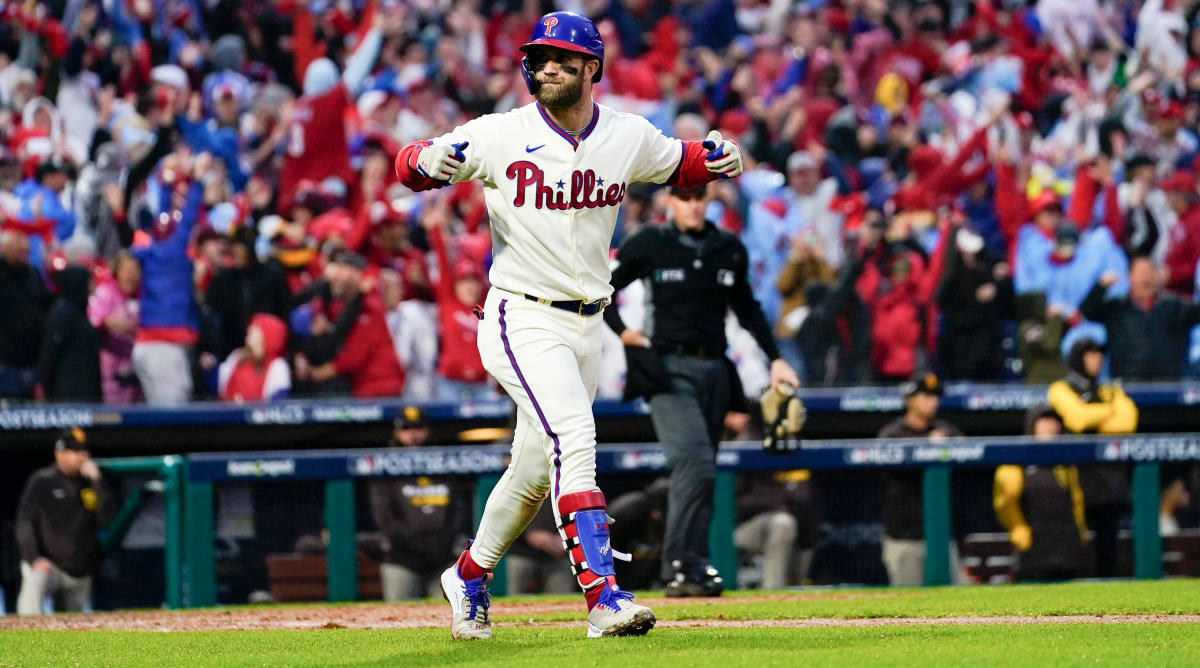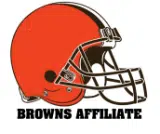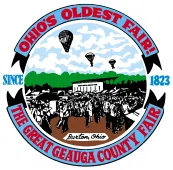His pennant-clinching home run goes on the short list of greatest homers hit by the greatest of players.
PHILADELPHIA — Postseason baseball is about the spin of a roulette wheel. Unlike football and basketball, where you can give the big moment to your best player, baseball is about taking turns. It is the most democratic of our games. And so as the big wheel slows to a stop, the bouncing ball may stop in the crook of a Cookie Lavagetto or Bobby Thomson or Gene Larkin or Travis Ishikawa or any one of nine spots in a lineup. Those are moments of serendipity.
And then there are legends.
The intersection of the great player and the great moment is sport at its best. It is Henry Aaron hitting a walkoff homer to win the 1957 pennant. Just say the name and the year and you know. Carlton Fisk in 1975, Kirby Puckett in 1991, David Ortiz in 2013.
And now this: Bryce Harper in 2022.
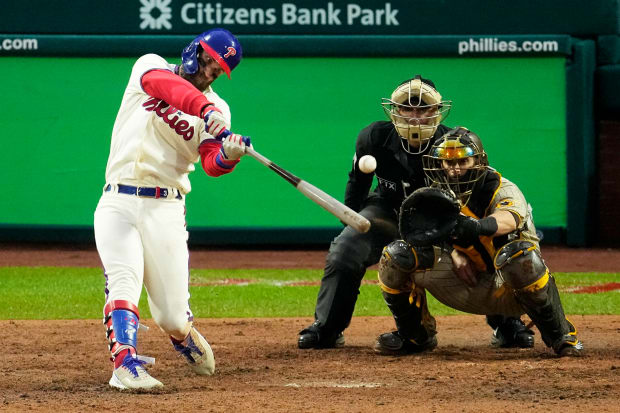
Matt Rourke/AP
The arc of Harper’s baseball life is as long as a rainbow, where it is hard to see both ends at once. From teenage cover boy to No. 1 draft pick to phenom to injury prone star to MVP to “overrated” to MVP again, Harper on Sunday night reached genuine legend status in Game 5 of the National League Championship Series. He hit the pennant-winning home run that put the Phillies in the World Series for the first time since 2009.
Not just any home run. A home run with the Phillies down, 3–2, to the Padres and down to their last six outs. A two-strike home run. A forever home run. This one in perpetuity goes on the short list of greatest home runs hit by the greatest of players.
“I hate to say it because it sounds unfair,” says Philadelphia catcher J.T. Realmuto, who singled in front of Harper’s home run, “but we have come to expect that from Bryce. He’s that special.”
Up in the stands, as the home run ball fell into the left-center field seats, Ron and Sheri Harper, Bryce’s parents, jumped up and down in each other’s arms. Sheri started to cry. And then Ron, the jacked former iron worker who withstood brutal Las Vegas summers to help build the Vegas strip, almost lost it himself.
“She cried. We cried,” he says. “Well, I tried not to. I don’t cry a lot, but I got pretty choked up.”
All a mother and father want for their child is happiness. It is no different when their child has signed $377 million worth of contracts and has won two MVPs and been named to seven All-Star teams before his 30th birthday. The security and accolades are great. But only this month, as Bryce and the Phillies play with this visible joie de vivre, has Ron seen that true happiness and lightness of being in his son since he became a professional.
Watching Bryce play like this brings Ron back to 2009, when Bryce was 17 and playing on the USA 18U national team with Manny Machado and Nick Castellanos. The world wasn’t so complicated. More telling, Bryce did not have to live up to being the biggest star in the room every waking moment. He wasn’t supposed to carry the team. He did not have to be a celebrity. He was just another kid playing ball, trying to win.
“I’m just happy for Bryce,” Ron says. “I’ve always wanted Bryce just to be happy. I told you that a long time ago: just be happy and go play for a city that loves you. I think he’s at that point. And I don’t think he’s done.
“That’s what I mean. I’ve always wanted him to be that kid, who just enjoys playing, like back with Machado and Castellanos on Team USA. I wanted him to just enjoy playing baseball again. And I see it. I see a city that loves him. And everybody, from ownership on down, loves him. And he loves them back. And he’s part of a team with one heartbeat, all pulling on the same rope.
“I see the love in his heart and in his eyes. You just see a different look in his eyes, like ‘I want to be here. I want to be in this moment.’”
This time, the ball in the roulette wheel landed on the right hitter at the right time. San Diego manager Bob Melvin unwittingly accommodated such history.
Up 3–2 with six outs to bring the series back to San Diego, Melvin asked righthander Robert Suárez to get as many outs as he could in a second inning. His left-handed closer, Josh Hader, was throwing in the bullpen before the inning began.
“We were going to look for four outs [from Hader],” Melvin said. “We were trying to split it up with he and Suárez. But, look, we've got a lot of confidence in Suárez. He came in and did a great job the inning before. We just fell a little bit short there.”
Harper was due to hit second in the eighth, which means if Melvin was hoping to use Hader for four outs, he was committed to using a righthander on Harper with his season on the line.
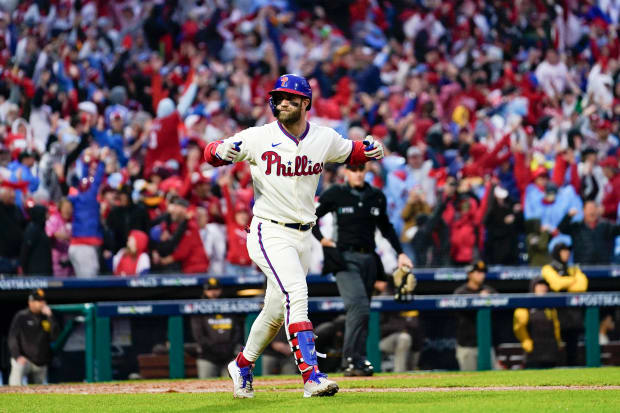
Matt Slocum/AP
Stop right there. Harper is all the matters. Saving Hader to face the bottom half of the Philadelphia lineup is foolhardy when the best, hottest hitter in baseball is where your season is jeopardized. You must prioritize Harper. He is that good right now.
Realmuto singled. Now Harper represented the go-ahead run, making that at bat all the more important to Melvin. The manager did not move. Suárez would pitch to Harper while Hader was pitching to the bullpen catcher, a snapshot in time the Padres will have to live with.
What happened next were seven pitches of pure hitting genius. Suárez started Harper with a 96-mph sinker away, which Harper fouled off. He came back with a high 97-mph four-seamer, but one that was so high it was non-competitive. Suárez went back to the sinker in nearly the same spot as the first one, this time at two ticks faster on the radar gun. Harper fouled that one off, too.
Down 1-and-2, Harper hunkered down into two-strike mode. He spread his feet a little farther apart, as if literally making himself immovable. It is part of what makes Harper devastatingly great as a hitter. He can cover any pitch in any area while modifying his setup, approach and even his swing.
Suárez threw his best bullet, a four-seamer up and away at 100. Harper flicked that one foul, too. So Suárez went back to another sinker, this one harder, too, at 99. And Harper fouled that one, too.
Suárez then executed a perfect 92-mph changeup, starting it at the bottom of the strike zone before it tantalizingly frittered just below it. Amazingly, Harper did not flinch. There was no drift in his body. His hands did not anxiously start forward. Somehow after five straight fastballs at between 96 and 100 mph, he instantly decoded a perfect changeup and watched it go by for a ball. You can watch a year’s worth of baseball and never see a better take.
As the legend grows, and Harper’s pennant-winning home run becomes an iconic video highlight, if there is any justice his take of that 1-and-2 changeup will be shown in tandem with that home run swing. The take and the swing were of equal brilliance.
Like a lion coiled in the savannah grassland, Harper now had his prey in sight. He knew Suárez was going back to his fastball after his one attempt at tricking him had failed. And Harper knew where the pitch would be: outside. All six pitches, except for the non-competitive mistake of a second pitch, were away. Suárez was never going to challenge Harper inside with the tying run on base so late in the game.
Harper set his sights on hard away, and that is exactly what Suárez threw him. The great ones don’t miss. Harper did not miss.
Back in 2019, when Harper was a free agent, and so many teams passed on him because of “poor defensive metrics” or a slugging percentage of “only” .496 in his walk year, Phillies CEO John Middleton picked Harper over fellow free agent Machado.
“His character,” Middleton says when I ask him why he liked Harper. “The sense that I got from him was that he was going to do whatever it took. You could hand him $300 million, $400 million, $500 million and it wasn’t going to change the guy. If he had to play another position, if he had to move up and down the lineup, he just wants to win.
“Bryce fit us from a roster construction standpoint. We had nobody in the majors or minors in the outfield. We had just drafted Alex Bohm. We had a third baseman. We had nothing in the outfield.”
Middleton, who grew up in Philadelphia and whose family has roots in the city going back two centuries, adds, “He’s a blue-collar guy who works. This is a town where you have to do that.”
Says Ron, when I ask why Philly and Bryce are such a good fit, “I think because I was an iron worker and blue collar and he was raised in that kind of family. HIs work ethic. They appreciate the fact he hustles out of the box every night and works hard and is never satisfied.”
After the game, bedlam all around, Bryce found Ron and Sheri on the field at Citizens Bank Park.
“I gave him a hug,” Bryce says of Ron. “I told him I love him. I told him I was just grateful for the opportunity.
“Then he said, ‘Four more.’ And I said, ‘Yes, sir.’”
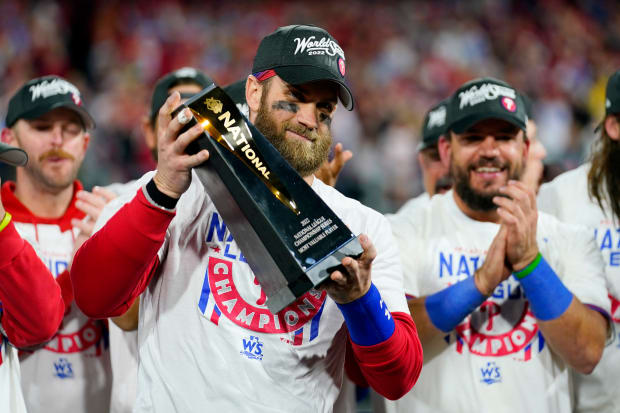
Matt Slocum/AP
Harper was 16 years old when I met Ron and Sheri and Bryce and his two siblings at their Las Vegas home to report a story about this baseball prodigy, not yet well known. Ron could not help but make the connection from when we first met to my handing Bryce the NLCS MVP trophy.
“Looking up there I thought about you and us watching Bryce play in a high school baseball game, and there you are standing next to him on a night he’s going to the World Series,” Ron says. “Life goes fast. It’s amazing.”
All these years later, a mother and father have their wish. The wish is not that Bryce Harper will play in his first World Series. It is that he is, simply, happy.
“It reminds me of that movie, Hook,” Sheri says. “‘Oh, there you are Peter. You’re finally back.’”
More MLB Coverage:
• Victory Belle: Inside the Phillies’ Post-Win Celebration
• Bryce Harper Is Keeping His Promise to the Team of Destiny Phillies
• Jean Segura’s Wild Ride Takes Phillies Closer to the World Series
• Phillies Manager Rob Thomson Having One Heck of a Postseason




